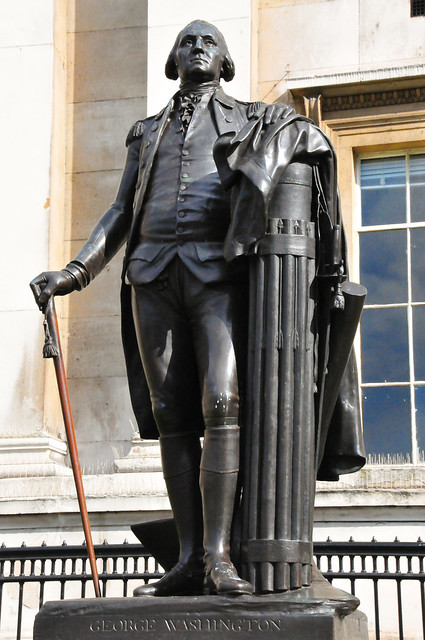You know exactly what I meant.
He was a British subject, and turned on his king.
How is that NOT being a traitor?
So you feel Washington was a traitor, Benedict Arnold was a hero and this country would have been better off if the founders hadn't declared independence from a government over 3,000 miles away who demanded gold and goods from it's "colony"?
Wow, I'm sure those thoughts are shared by most Republicans. And this is why your kind must be defeated. You want this country to be subjects of a foreign power. Perhaps you would be happier over there than over here?
Benedict Arnold was one of the main reasons Washington won many of his campaigns... the guy got kicked in the teeth by Washington at promotion time and the rest is history.....and you are right dean,the far right must be defeated BUT, so must your kind the far left.....both of you assholes are destroying this country with your "be like me and accept what i accept" bullshit or fuck you......
So you are defending Benedict Arnold? You felt he was a mistreated hero?
Next, you'll be telling us the positives of slavery and why gays need to be killed.
im telling you history dipshit....prove arnold wasnt one of Americas best generals back then and i will apologize to you,but if you cant you apologize to me....you game?...
The best general was a traitor?
i dont know about the best,but one of the better ones at that time....do some research like you tell everyone else to do....
this is from the History channel....
HERO OF THE AMERICAN REVOLUTION
When the Revolutionary War broke out between Great Britain and its 13 American colonies in April 1775, Arnold joined the Continental Army. Acting under a commission from the revolutionary government of
Massachusetts, Arnold partnered with
Vermont frontiersman Ethan Allen (1738-89) and Allen’s Green Mountain Boys to capture the unsuspecting British garrison at Fort Ticonderoga in upstate
New York on May 10, 1775. Later that year, Arnold led an ill-fated expedition on a harrowing trek from
Maine to Quebec. The purpose of the expedition was to rally the inhabitants of Canada behind the Patriot cause and deprive the British government of a northern base from which to mount strikes into the 13 colonies. With the enlistments of many of his men expiring on New Year’s Day, Arnold had no choice but to launch a desperate attack against well-fortified Quebec City through a blizzard on December 31, 1775. Early in the battle, Arnold received a grave wound to his leg and was carried to the back of the battlefield. The assault continued, but failed miserably. Hundreds of American soldiers were killed, wounded or captured, and Canada remained in British hands.
By the later part of 1776, Arnold had recovered sufficiently from his wound to once again take the field. He played a crucial role in hindering a British invasion from Canada into New York in the autumn of that year. Correctly predicting that British General Guy Carleton (1724-1808) would sail an invading force down Lake Champlain, Arnold supervised the hasty construction of an American flotilla on that lake to meet Carleton’s fleet. On October 11, 1776, the American fleet surprised its foe near Valcour Bay. Although Carleton’s flotilla drove the Americans away, Arnold’s action delayed Carleton’s approach long enough that, by the time the British general reached New York, the battle season was near an end, and the British had to return to Canada. Arnold’s performance at the Battle of Lake Champlain rescued the Patriot cause from potential disaster.
Despite his heroic service, Arnold felt he did not receive the recognition he deserved. He resigned from the Continental Army in 1777 after Congress promoted five junior officers above him. General
George Washington (1732-99), the commander in chief of the Continental Army, urged Arnold to reconsider. Arnold rejoined the army in time to participate in the defense of central New York from an invading British force under General John Burgoyne in the fall of 1777.
In the battles against Burgoyne, Arnold served under General Horatio Gates (1728-1806), an officer whom Arnold came to hold in contempt. The antipathy was mutual, and Gates at one point relieved Arnold of his command. Nonetheless, at the pivotal Battle of Bemis Heights on October 7, 1777, Arnold defied Gates’ authority and took command of a group of American soldiers whom he led in an assault against the British line. Arnold’s attack threw the enemy into disarray and contributed greatly to the American victory. Ten days later, Burgoyne surrendered his entire army at Saratoga. News of the surrender convinced France to enter the war on the side of the Americans. Once again, Arnold had brought his country a step closer to independence. However, Gates downplayed Arnold’s contributions in his official reports and claimed most of the credit for himself.
Meanwhile, Arnold seriously wounded the same leg he had injured at Quebec in the battle. Rendered temporarily incapable of a field command, he accepted the position of military governor of Philadelphia in 1778. While there, his loyalties began to change.

